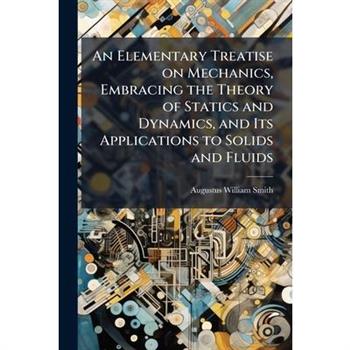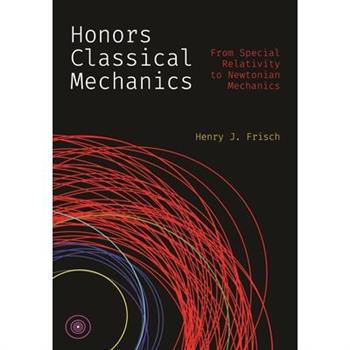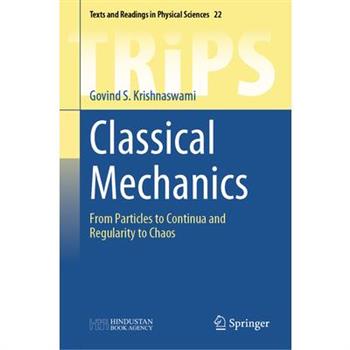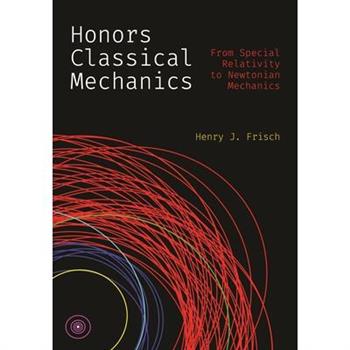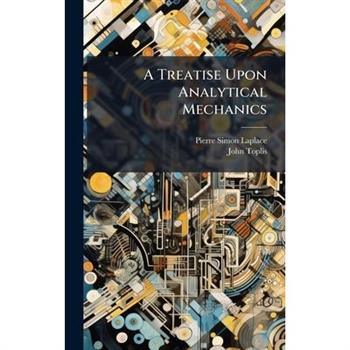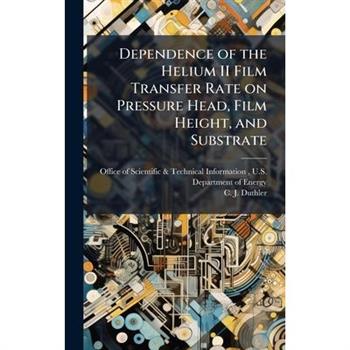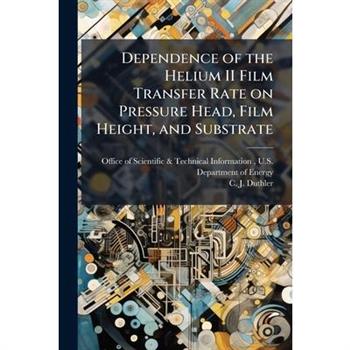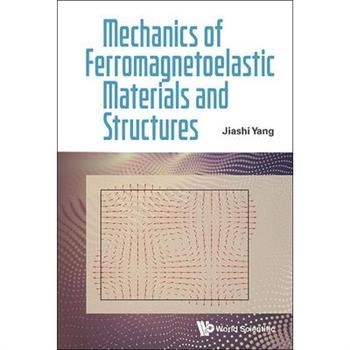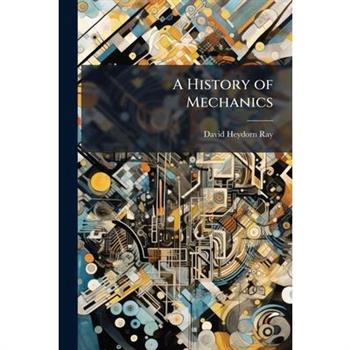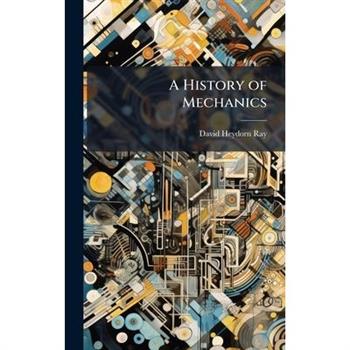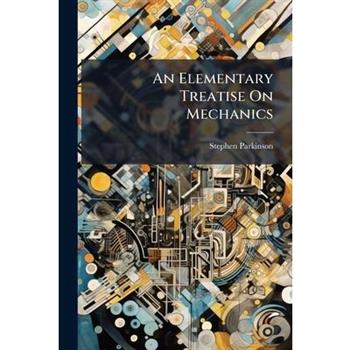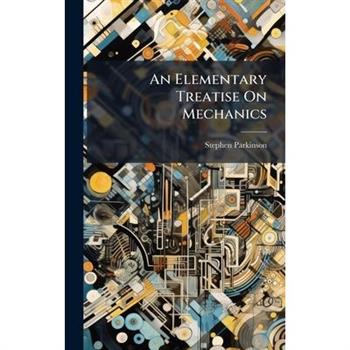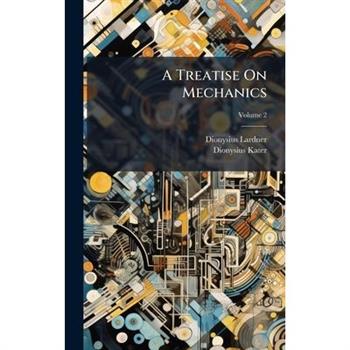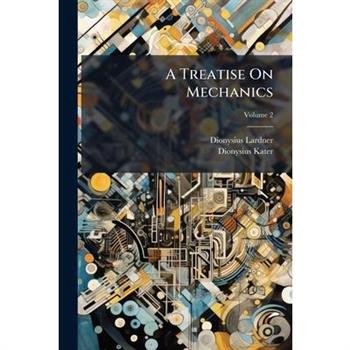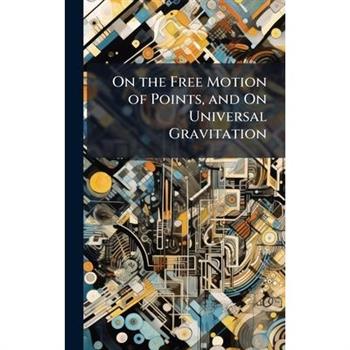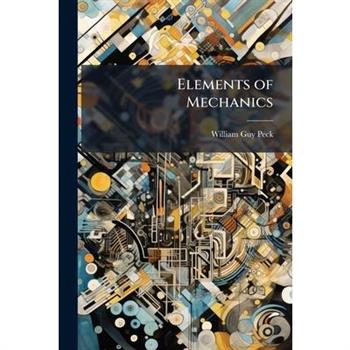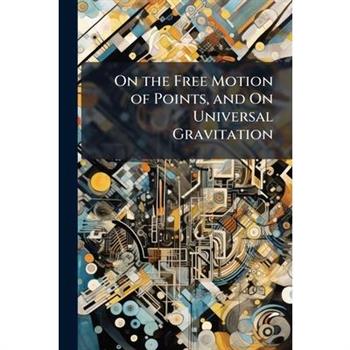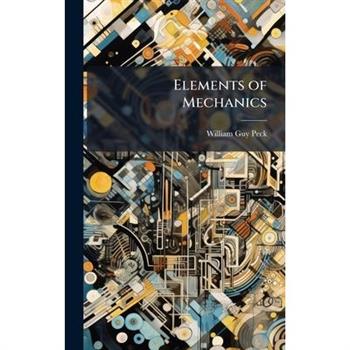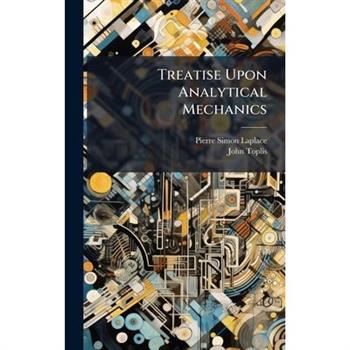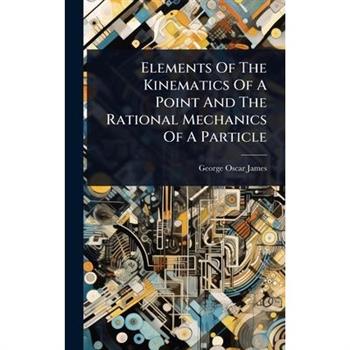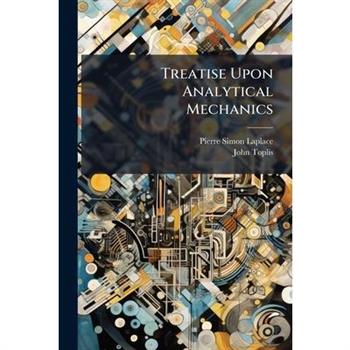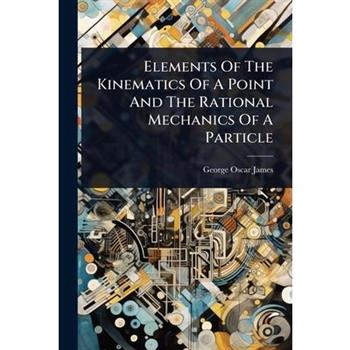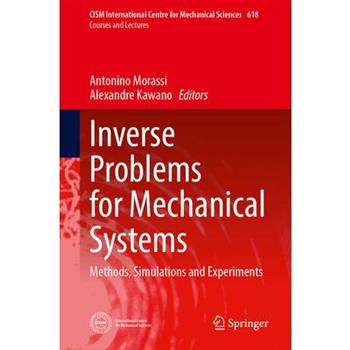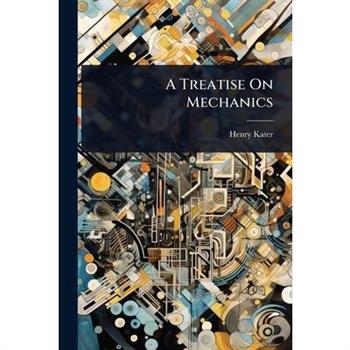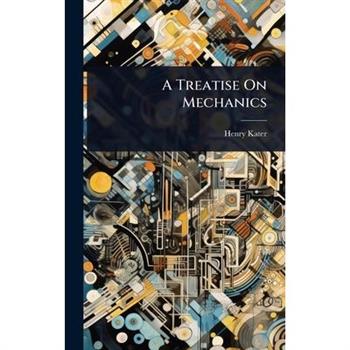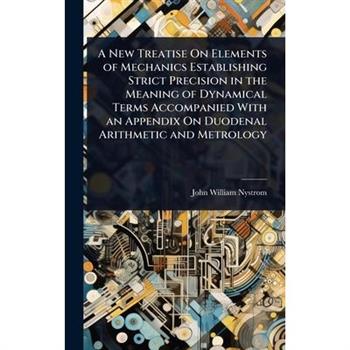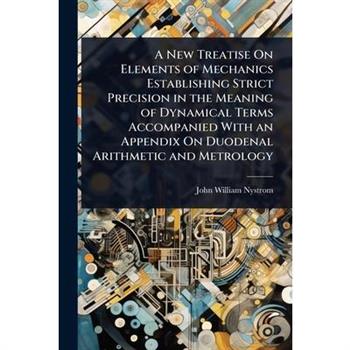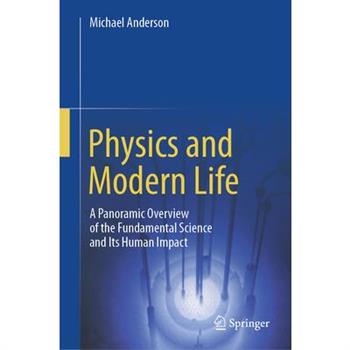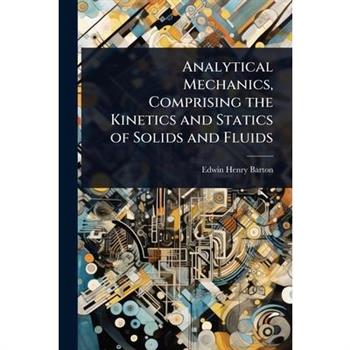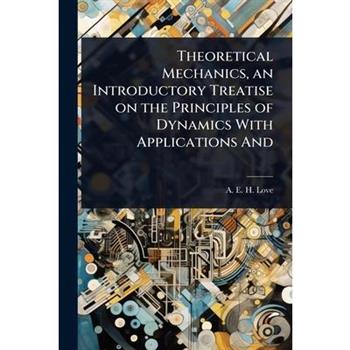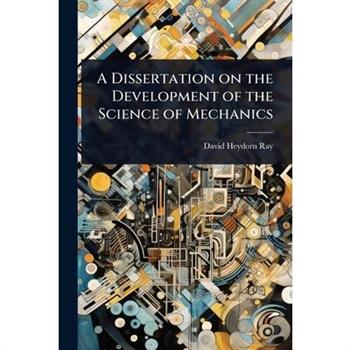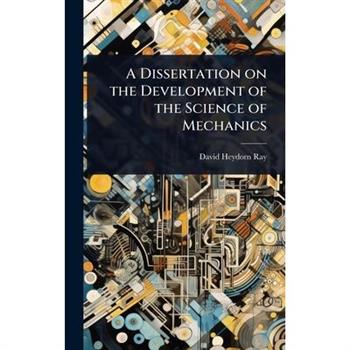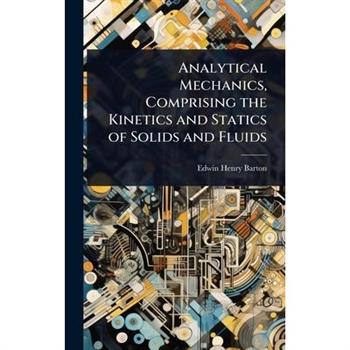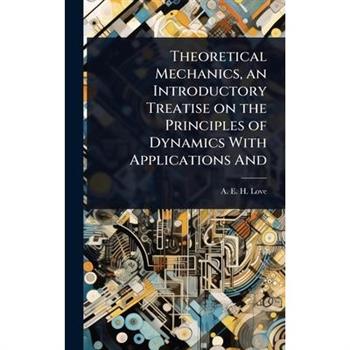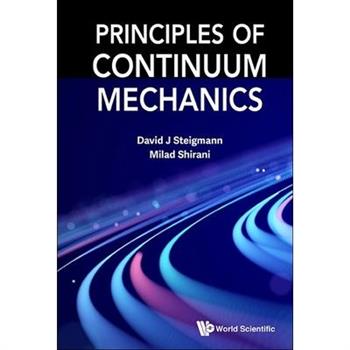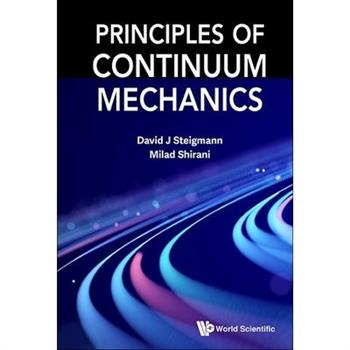An Elementary Treatise on Mechanics, Embracing the Theory of Statics and Dynamics, and Its Applications to Solids and Fluids
"An Elementary Treatise on Mechanics" by Augustus William Smith, originally published in 1849, offers a comprehensive exploration of mechanics, encompassing both statics and dynamics. This treatise delves into the fundamental principles governing the behavior of solids and fluids, presenting a rigorous theoretical framework alongside practical applications. Suitable for students and scholars alike, this work provides a foundational understanding of classical mechanics. Its enduring value lies in its clear exposition of core concepts and its detailed examination of mechanical phenomena, making it a valuable resource for anyone interested in the history and development of physics and engineering.This work has been selected by scholars as being culturally important, and is part of the knowledge base of civilization as we know it. This work was reproduced from the original artifact, and remains as true to the original work as possible. Therefore, you will see the original copyright references, library stamps (as most of these works have been housed in our most important libraries around the world), and other notations in the work.This work is in the public domain in the United States of America, and possibly other nations. Within the United States, you may freely copy and distribute this work, as no entity (individual or corporate) has a copyright on the body of the work.As a reproduction of a historical artifact, this work may contain missing or blurred pages, poor pictures, errant marks, etc. Scholars believe, and we concur, that this work is important enough to be preserved, reproduced, and made generally available to the public. We appreciate your support of the preservation process, and thank you for being an important part of keeping this knowledge alive and relevant.
Honors Classical Mechanics
A modern introduction to classical mechanics that allows students to develop confidence, a broad mathematical tool kit, and a correct physical intuition while working in a collaborative and supportive environment Undergraduate physics students must often "unlearn" aspects of classical mechanics as they progress through college and graduate school. This book, by introducing classical mechanics as the limiting case in special relativity of an infinite speed of light, eliminates the need for such backtracking. Starting with time/space, and energy/momentum, the book allows students to solve problems addressing modern topics of research in astronomy, cosmology, and particle physics. The text then derives Newtonian mechanics, and covers the full syllabus of a conventional introductory course, but at a deeper level of mathematical sophistication for topics such as rigid body and planetary motion. Extensive mathematical appendixes are integrated into the text, as are curated problems sets in each chapter. The book is intended as a long-overdue revision of both the curriculum and pedagogy of the traditional introductory honors classical mechanics course.Begins with special relativity as a "leveler" that puts all students at the same starting pointRelies on cooperative learning rather than a competitive "weed-out" mentalityEmphasizes developing mathematical tools as a precise and powerful language in the context of developing a correct intuition and better understanding of physical phenomenaEnables a more rapid path through the conventional undergraduate physics curriculum, preparing students for advanced courses in science and engineering
Honors Classical Mechanics
A modern introduction to classical mechanics that allows students to develop confidence, a broad mathematical tool kit, and a correct physical intuition while working in a collaborative and supportive environment Undergraduate physics students must often "unlearn" aspects of classical mechanics as they progress through college and graduate school. This book, by introducing classical mechanics as the limiting case in special relativity of an infinite speed of light, eliminates the need for such backtracking. Starting with time/space, and energy/momentum, the book allows students to solve problems addressing modern topics of research in astronomy, cosmology, and particle physics. The text then derives Newtonian mechanics, and covers the full syllabus of a conventional introductory course, but at a deeper level of mathematical sophistication for topics such as rigid body and planetary motion. Extensive mathematical appendixes are integrated into the text, as are curated problems sets in each chapter. The book is intended as a long-overdue revision of both the curriculum and pedagogy of the traditional introductory honors classical mechanics course.Begins with special relativity as a "leveler" that puts all students at the same starting pointRelies on cooperative learning rather than a competitive "weed-out" mentalityEmphasizes developing mathematical tools as a precise and powerful language in the context of developing a correct intuition and better understanding of physical phenomenaEnables a more rapid path through the conventional undergraduate physics curriculum, preparing students for advanced courses in science and engineering
A Treatise Upon Analytical Mechanics
"A Treatise Upon Analytical Mechanics," being the first book of the "M矇canique C矇leste," presents a comprehensive exploration of celestial mechanics by Pierre Simon Laplace, translated by John Toplis. This foundational work delves into the mathematical principles governing the motions of celestial bodies. Laplace's treatise offers an in-depth analysis of gravitational forces and their effects on planetary orbits, employing advanced mathematical techniques to explain and predict astronomical phenomena. This volume provides essential insights into the analytical methods used to solve complex problems in physics and astronomy, making it invaluable for students and researchers in these fields. With its rigorous approach and detailed explanations, "A Treatise Upon Analytical Mechanics" remains a cornerstone text for understanding the mathematical underpinnings of the universe.This work has been selected by scholars as being culturally important, and is part of the knowledge base of civilization as we know it. This work was reproduced from the original artifact, and remains as true to the original work as possible. Therefore, you will see the original copyright references, library stamps (as most of these works have been housed in our most important libraries around the world), and other notations in the work.This work is in the public domain in the United States of America, and possibly other nations. Within the United States, you may freely copy and distribute this work, as no entity (individual or corporate) has a copyright on the body of the work.As a reproduction of a historical artifact, this work may contain missing or blurred pages, poor pictures, errant marks, etc. Scholars believe, and we concur, that this work is important enough to be preserved, reproduced, and made generally available to the public. We appreciate your support of the preservation process, and thank you for being an important part of keeping this knowledge alive and relevant.
Dependence of the Helium II Film Transfer Rate on Pressure Head, Film Height, and Substrate
The Office of Scientific & Technical Information (OSTI), is a part of the U.S. Department of Energy (DOE) that houses research and development results from projects funded by the DOE. The information is generally an article, technical document, conference paper or dissertation. This is one of those publications.This work has been selected by scholars as being culturally important, and is part of the knowledge base of civilization as we know it. This work was reproduced from the original artifact, and remains as true to the original work as possible. Therefore, you will see the original copyright references, library stamps (as most of these works have been housed in our most important libraries around the world), and other notations in the work.This work is in the public domain in the United States of America, and possibly other nations. Within the United States, you may freely copy and distribute this work, as no entity (individual or corporate) has a copyright on the body of the work.As a reproduction of a historical artifact, this work may contain missing or blurred pages, poor pictures, errant marks, etc. Scholars believe, and we concur, that this work is important enough to be preserved, reproduced, and made generally available to the public. We appreciate your support of the preservation process, and thank you for being an important part of keeping this knowledge alive and relevant.
Dependence of the Helium II Film Transfer Rate on Pressure Head, Film Height, and Substrate
The Office of Scientific & Technical Information (OSTI), is a part of the U.S. Department of Energy (DOE) that houses research and development results from projects funded by the DOE. The information is generally an article, technical document, conference paper or dissertation. This is one of those publications.This work has been selected by scholars as being culturally important, and is part of the knowledge base of civilization as we know it. This work was reproduced from the original artifact, and remains as true to the original work as possible. Therefore, you will see the original copyright references, library stamps (as most of these works have been housed in our most important libraries around the world), and other notations in the work.This work is in the public domain in the United States of America, and possibly other nations. Within the United States, you may freely copy and distribute this work, as no entity (individual or corporate) has a copyright on the body of the work.As a reproduction of a historical artifact, this work may contain missing or blurred pages, poor pictures, errant marks, etc. Scholars believe, and we concur, that this work is important enough to be preserved, reproduced, and made generally available to the public. We appreciate your support of the preservation process, and thank you for being an important part of keeping this knowledge alive and relevant.
Analytical and Experimental Modal Analysis
This book covers the fundamentals and basic concepts of analytical and experimental approaches to modal analysis. It is inspired by this consideration and is written to give a complete picture of modal analysis.
Mechanics of Ferromagnetoelastic Materials and Structures
This book presents macroscopic theories of magnetoelastic interactions in solids, mainly for saturated ferromagnetoelastic materials. In these materials, the distributed magnetic moments are aligned and have a fixed magnitude. A disturbance of the magnetic moments propagates as what is called spin waves. In elastic ferromagnets, acoustic waves may interact with spin waves, which is referred to as phonon-magnon interaction. Continuum modeling of magnetoelastic interactions in saturated ferromagnets has a few unique and interesting features. In addition to the magnetic body force and couple on the magnetic moments, the short-range interaction among neighboring magnetic moments may be described by distributed surface couples. This leads to a magnetization gradient theory. The angular momenta associated with the magnetic moments need to be considered for spin waves. In addition, the saturation condition on the magnetization vector functions as a constraint mathematically, which has important implications in the constitutive relations of these materials.The book discusses the relatively simple situation of rigid ferromagnets first and then proceeds to elastic ferromagnets. Thermal and dissipative effects as well as interactions with electromagnetic waves are also considered. Structural problems of elastic plates and beams with magnetoelastic interactions are treated as well.
A History of Mechanics
A History of Mechanics by David Heydorn Ray offers a comprehensive overview of the development of mechanics. This meticulously researched work reviews the key contributions of leading figures in the field, providing readers with a deep understanding of the science's evolution. The book features a detailed table outlining the development of mechanics, a critical examination of fundamental concepts, and an extensive bibliography. This historical account serves as an invaluable resource for students, researchers, and anyone interested in the intellectual journey of mechanics. Ray's work illuminates the progression of ideas and the brilliant minds that shaped our understanding of motion and forces. This edition ensures that Ray's significant contribution remains accessible to a new generation of scholars.This work has been selected by scholars as being culturally important, and is part of the knowledge base of civilization as we know it. This work was reproduced from the original artifact, and remains as true to the original work as possible. Therefore, you will see the original copyright references, library stamps (as most of these works have been housed in our most important libraries around the world), and other notations in the work.This work is in the public domain in the United States of America, and possibly other nations. Within the United States, you may freely copy and distribute this work, as no entity (individual or corporate) has a copyright on the body of the work.As a reproduction of a historical artifact, this work may contain missing or blurred pages, poor pictures, errant marks, etc. Scholars believe, and we concur, that this work is important enough to be preserved, reproduced, and made generally available to the public. We appreciate your support of the preservation process, and thank you for being an important part of keeping this knowledge alive and relevant.
A History of Mechanics
A History of Mechanics by David Heydorn Ray offers a comprehensive overview of the development of mechanics. This meticulously researched work reviews the key contributions of leading figures in the field, providing readers with a deep understanding of the science's evolution. The book features a detailed table outlining the development of mechanics, a critical examination of fundamental concepts, and an extensive bibliography. This historical account serves as an invaluable resource for students, researchers, and anyone interested in the intellectual journey of mechanics. Ray's work illuminates the progression of ideas and the brilliant minds that shaped our understanding of motion and forces. This edition ensures that Ray's significant contribution remains accessible to a new generation of scholars.This work has been selected by scholars as being culturally important, and is part of the knowledge base of civilization as we know it. This work was reproduced from the original artifact, and remains as true to the original work as possible. Therefore, you will see the original copyright references, library stamps (as most of these works have been housed in our most important libraries around the world), and other notations in the work.This work is in the public domain in the United States of America, and possibly other nations. Within the United States, you may freely copy and distribute this work, as no entity (individual or corporate) has a copyright on the body of the work.As a reproduction of a historical artifact, this work may contain missing or blurred pages, poor pictures, errant marks, etc. Scholars believe, and we concur, that this work is important enough to be preserved, reproduced, and made generally available to the public. We appreciate your support of the preservation process, and thank you for being an important part of keeping this knowledge alive and relevant.
An Elementary Treatise On Mechanics
"An Elementary Treatise On Mechanics" by Stephen Parkinson is a comprehensive textbook designed for junior university students and advanced secondary school students. This book provides a rigorous introduction to the principles of mechanics, combining theoretical explanations with practical examples to enhance understanding. Parkinson's approach emphasizes clarity and precision, making complex concepts accessible to learners. The treatise includes a wide array of examples to illustrate key concepts and test the reader's comprehension. This book remains a valuable resource for anyone seeking a solid foundation in mechanics and its applications.This work has been selected by scholars as being culturally important, and is part of the knowledge base of civilization as we know it. This work was reproduced from the original artifact, and remains as true to the original work as possible. Therefore, you will see the original copyright references, library stamps (as most of these works have been housed in our most important libraries around the world), and other notations in the work.This work is in the public domain in the United States of America, and possibly other nations. Within the United States, you may freely copy and distribute this work, as no entity (individual or corporate) has a copyright on the body of the work.As a reproduction of a historical artifact, this work may contain missing or blurred pages, poor pictures, errant marks, etc. Scholars believe, and we concur, that this work is important enough to be preserved, reproduced, and made generally available to the public. We appreciate your support of the preservation process, and thank you for being an important part of keeping this knowledge alive and relevant.
An Elementary Treatise On Mechanics
"An Elementary Treatise On Mechanics" by Stephen Parkinson is a comprehensive textbook designed for junior university students and advanced secondary school students. This book provides a rigorous introduction to the principles of mechanics, combining theoretical explanations with practical examples to enhance understanding. Parkinson's approach emphasizes clarity and precision, making complex concepts accessible to learners. The treatise includes a wide array of examples to illustrate key concepts and test the reader's comprehension. This book remains a valuable resource for anyone seeking a solid foundation in mechanics and its applications.This work has been selected by scholars as being culturally important, and is part of the knowledge base of civilization as we know it. This work was reproduced from the original artifact, and remains as true to the original work as possible. Therefore, you will see the original copyright references, library stamps (as most of these works have been housed in our most important libraries around the world), and other notations in the work.This work is in the public domain in the United States of America, and possibly other nations. Within the United States, you may freely copy and distribute this work, as no entity (individual or corporate) has a copyright on the body of the work.As a reproduction of a historical artifact, this work may contain missing or blurred pages, poor pictures, errant marks, etc. Scholars believe, and we concur, that this work is important enough to be preserved, reproduced, and made generally available to the public. We appreciate your support of the preservation process, and thank you for being an important part of keeping this knowledge alive and relevant.
A Treatise On Mechanics
"A Treatise On Mechanics, Volume 2" by Dionysius Lardner and Dionysius Kater, originally published in 1831, offers a comprehensive exploration of the principles of mechanics. This volume delves into advanced topics, building upon fundamental concepts to provide a thorough understanding of both statics and dynamics. Intended for students and practitioners alike, this treatise presents mathematical frameworks and practical applications relevant to engineering and physics. The book's enduring value lies in its detailed explanations and rigorous approach, making it a valuable resource for those seeking a deep understanding of mechanical principles.This work has been selected by scholars as being culturally important, and is part of the knowledge base of civilization as we know it. This work was reproduced from the original artifact, and remains as true to the original work as possible. Therefore, you will see the original copyright references, library stamps (as most of these works have been housed in our most important libraries around the world), and other notations in the work.This work is in the public domain in the United States of America, and possibly other nations. Within the United States, you may freely copy and distribute this work, as no entity (individual or corporate) has a copyright on the body of the work.As a reproduction of a historical artifact, this work may contain missing or blurred pages, poor pictures, errant marks, etc. Scholars believe, and we concur, that this work is important enough to be preserved, reproduced, and made generally available to the public. We appreciate your support of the preservation process, and thank you for being an important part of keeping this knowledge alive and relevant.
A Treatise On Mechanics
"A Treatise On Mechanics, Volume 2" by Dionysius Lardner and Dionysius Kater, originally published in 1831, offers a comprehensive exploration of the principles of mechanics. This volume delves into advanced topics, building upon fundamental concepts to provide a thorough understanding of both statics and dynamics. Intended for students and practitioners alike, this treatise presents mathematical frameworks and practical applications relevant to engineering and physics. The book's enduring value lies in its detailed explanations and rigorous approach, making it a valuable resource for those seeking a deep understanding of mechanical principles.This work has been selected by scholars as being culturally important, and is part of the knowledge base of civilization as we know it. This work was reproduced from the original artifact, and remains as true to the original work as possible. Therefore, you will see the original copyright references, library stamps (as most of these works have been housed in our most important libraries around the world), and other notations in the work.This work is in the public domain in the United States of America, and possibly other nations. Within the United States, you may freely copy and distribute this work, as no entity (individual or corporate) has a copyright on the body of the work.As a reproduction of a historical artifact, this work may contain missing or blurred pages, poor pictures, errant marks, etc. Scholars believe, and we concur, that this work is important enough to be preserved, reproduced, and made generally available to the public. We appreciate your support of the preservation process, and thank you for being an important part of keeping this knowledge alive and relevant.
On the Free Motion of Points, and On Universal Gravitation
"On the Free Motion of Points, and On Universal Gravitation" delves into the fundamental principles of mechanics and physics, exploring the motion of points and the intricacies of universal gravitation. This treatise includes the principal propositions of Books I and III of Newton's groundbreaking "Principia," offering readers a deep dive into classical dynamics. As the first part of a new edition of a treatise on dynamics, this work provides a rigorous examination of the mathematical and theoretical underpinnings of gravitational forces and their effects on moving bodies. Ideal for students and scholars of physics, mathematics, and the history of science, this book offers both a historical perspective and a thorough exposition of essential concepts, making it a valuable resource for understanding the foundations of modern physics and celestial mechanics.This work has been selected by scholars as being culturally important, and is part of the knowledge base of civilization as we know it. This work was reproduced from the original artifact, and remains as true to the original work as possible. Therefore, you will see the original copyright references, library stamps (as most of these works have been housed in our most important libraries around the world), and other notations in the work.This work is in the public domain in the United States of America, and possibly other nations. Within the United States, you may freely copy and distribute this work, as no entity (individual or corporate) has a copyright on the body of the work.As a reproduction of a historical artifact, this work may contain missing or blurred pages, poor pictures, errant marks, etc. Scholars believe, and we concur, that this work is important enough to be preserved, reproduced, and made generally available to the public. We appreciate your support of the preservation process, and thank you for being an important part of keeping this knowledge alive and relevant.
Elements of Mechanics
"Elements of Mechanics" presents a comprehensive exploration of the fundamental principles governing motion and forces. Authored by William Guy Peck, this volume offers a rigorous and systematic treatment of mechanics, suitable for students and practitioners alike. The book covers a wide range of topics, from the basic laws of motion to more advanced concepts such as work, energy, and the dynamics of rigid bodies. With clear explanations and numerous examples, "Elements of Mechanics" serves as an invaluable resource for anyone seeking a solid foundation in this essential scientific discipline. This enduring work provides insights into the mathematical underpinnings of the physical world, making it a valuable addition to any scientific library. This work has been selected by scholars as being culturally important, and is part of the knowledge base of civilization as we know it. This work was reproduced from the original artifact, and remains as true to the original work as possible. Therefore, you will see the original copyright references, library stamps (as most of these works have been housed in our most important libraries around the world), and other notations in the work.This work is in the public domain in the United States of America, and possibly other nations. Within the United States, you may freely copy and distribute this work, as no entity (individual or corporate) has a copyright on the body of the work.As a reproduction of a historical artifact, this work may contain missing or blurred pages, poor pictures, errant marks, etc. Scholars believe, and we concur, that this work is important enough to be preserved, reproduced, and made generally available to the public. We appreciate your support of the preservation process, and thank you for being an important part of keeping this knowledge alive and relevant.
On the Free Motion of Points, and On Universal Gravitation
"On the Free Motion of Points, and On Universal Gravitation" delves into the fundamental principles of mechanics and physics, exploring the motion of points and the intricacies of universal gravitation. This treatise includes the principal propositions of Books I and III of Newton's groundbreaking "Principia," offering readers a deep dive into classical dynamics. As the first part of a new edition of a treatise on dynamics, this work provides a rigorous examination of the mathematical and theoretical underpinnings of gravitational forces and their effects on moving bodies. Ideal for students and scholars of physics, mathematics, and the history of science, this book offers both a historical perspective and a thorough exposition of essential concepts, making it a valuable resource for understanding the foundations of modern physics and celestial mechanics.This work has been selected by scholars as being culturally important, and is part of the knowledge base of civilization as we know it. This work was reproduced from the original artifact, and remains as true to the original work as possible. Therefore, you will see the original copyright references, library stamps (as most of these works have been housed in our most important libraries around the world), and other notations in the work.This work is in the public domain in the United States of America, and possibly other nations. Within the United States, you may freely copy and distribute this work, as no entity (individual or corporate) has a copyright on the body of the work.As a reproduction of a historical artifact, this work may contain missing or blurred pages, poor pictures, errant marks, etc. Scholars believe, and we concur, that this work is important enough to be preserved, reproduced, and made generally available to the public. We appreciate your support of the preservation process, and thank you for being an important part of keeping this knowledge alive and relevant.
Elements of Mechanics
"Elements of Mechanics" presents a comprehensive exploration of the fundamental principles governing motion and forces. Authored by William Guy Peck, this volume offers a rigorous and systematic treatment of mechanics, suitable for students and practitioners alike. The book covers a wide range of topics, from the basic laws of motion to more advanced concepts such as work, energy, and the dynamics of rigid bodies. With clear explanations and numerous examples, "Elements of Mechanics" serves as an invaluable resource for anyone seeking a solid foundation in this essential scientific discipline. This enduring work provides insights into the mathematical underpinnings of the physical world, making it a valuable addition to any scientific library. This work has been selected by scholars as being culturally important, and is part of the knowledge base of civilization as we know it. This work was reproduced from the original artifact, and remains as true to the original work as possible. Therefore, you will see the original copyright references, library stamps (as most of these works have been housed in our most important libraries around the world), and other notations in the work.This work is in the public domain in the United States of America, and possibly other nations. Within the United States, you may freely copy and distribute this work, as no entity (individual or corporate) has a copyright on the body of the work.As a reproduction of a historical artifact, this work may contain missing or blurred pages, poor pictures, errant marks, etc. Scholars believe, and we concur, that this work is important enough to be preserved, reproduced, and made generally available to the public. We appreciate your support of the preservation process, and thank you for being an important part of keeping this knowledge alive and relevant.
Treatise Upon Analytical Mechanics
Treatise Upon Analytical Mechanics, originally published in 1814, presents a comprehensive exploration of the principles governing the motion and equilibrium of bodies, authored by the eminent Pierre Simon Laplace and translated by John Toplis. This foundational work delves into the application of mathematical analysis to mechanical problems, offering a rigorous treatment of topics such as statics, dynamics, and celestial mechanics. Laplace's treatise is distinguished by its systematic and abstract approach, emphasizing the use of calculus and differential equations to model and solve complex mechanical systems. This historical text remains valuable for students and researchers seeking a deeper understanding of the mathematical underpinnings of classical mechanics and its profound impact on the development of modern physics. This work has been selected by scholars as being culturally important, and is part of the knowledge base of civilization as we know it. This work was reproduced from the original artifact, and remains as true to the original work as possible. Therefore, you will see the original copyright references, library stamps (as most of these works have been housed in our most important libraries around the world), and other notations in the work.This work is in the public domain in the United States of America, and possibly other nations. Within the United States, you may freely copy and distribute this work, as no entity (individual or corporate) has a copyright on the body of the work.As a reproduction of a historical artifact, this work may contain missing or blurred pages, poor pictures, errant marks, etc. Scholars believe, and we concur, that this work is important enough to be preserved, reproduced, and made generally available to the public. We appreciate your support of the preservation process, and thank you for being an important part of keeping this knowledge alive and relevant.
Elements Of The Kinematics Of A Point And The Rational Mechanics Of A Particle
"Elements Of The Kinematics Of A Point And The Rational Mechanics Of A Particle" provides a detailed exploration of the fundamental principles governing the motion of particles and points. This book delves into the theoretical underpinnings of kinematics, offering a rigorous treatment suitable for students and researchers in physics, engineering, and mathematics.The text covers essential topics such as displacement, velocity, acceleration, and the mathematical tools necessary to analyze particle motion. It further explores the rational mechanics of a particle, examining the forces acting on it and the resultant motion based on Newtonian mechanics.George Oscar James presents the material in a clear and structured manner, making it an invaluable resource for anyone seeking a comprehensive understanding of these core concepts in classical mechanics. This work stands as a testament to the enduring importance of kinematics and rational mechanics in the broader field of physics.This work has been selected by scholars as being culturally important, and is part of the knowledge base of civilization as we know it. This work was reproduced from the original artifact, and remains as true to the original work as possible. Therefore, you will see the original copyright references, library stamps (as most of these works have been housed in our most important libraries around the world), and other notations in the work.This work is in the public domain in the United States of America, and possibly other nations. Within the United States, you may freely copy and distribute this work, as no entity (individual or corporate) has a copyright on the body of the work.As a reproduction of a historical artifact, this work may contain missing or blurred pages, poor pictures, errant marks, etc. Scholars believe, and we concur, that this work is important enough to be preserved, reproduced, and made generally available to the public. We appreciate your support of the preservation process, and thank you for being an important part of keeping this knowledge alive and relevant.
Treatise Upon Analytical Mechanics
Treatise Upon Analytical Mechanics, originally published in 1814, presents a comprehensive exploration of the principles governing the motion and equilibrium of bodies, authored by the eminent Pierre Simon Laplace and translated by John Toplis. This foundational work delves into the application of mathematical analysis to mechanical problems, offering a rigorous treatment of topics such as statics, dynamics, and celestial mechanics. Laplace's treatise is distinguished by its systematic and abstract approach, emphasizing the use of calculus and differential equations to model and solve complex mechanical systems. This historical text remains valuable for students and researchers seeking a deeper understanding of the mathematical underpinnings of classical mechanics and its profound impact on the development of modern physics. This work has been selected by scholars as being culturally important, and is part of the knowledge base of civilization as we know it. This work was reproduced from the original artifact, and remains as true to the original work as possible. Therefore, you will see the original copyright references, library stamps (as most of these works have been housed in our most important libraries around the world), and other notations in the work.This work is in the public domain in the United States of America, and possibly other nations. Within the United States, you may freely copy and distribute this work, as no entity (individual or corporate) has a copyright on the body of the work.As a reproduction of a historical artifact, this work may contain missing or blurred pages, poor pictures, errant marks, etc. Scholars believe, and we concur, that this work is important enough to be preserved, reproduced, and made generally available to the public. We appreciate your support of the preservation process, and thank you for being an important part of keeping this knowledge alive and relevant.
Elements Of The Kinematics Of A Point And The Rational Mechanics Of A Particle
"Elements Of The Kinematics Of A Point And The Rational Mechanics Of A Particle" provides a detailed exploration of the fundamental principles governing the motion of particles and points. This book delves into the theoretical underpinnings of kinematics, offering a rigorous treatment suitable for students and researchers in physics, engineering, and mathematics.The text covers essential topics such as displacement, velocity, acceleration, and the mathematical tools necessary to analyze particle motion. It further explores the rational mechanics of a particle, examining the forces acting on it and the resultant motion based on Newtonian mechanics.George Oscar James presents the material in a clear and structured manner, making it an invaluable resource for anyone seeking a comprehensive understanding of these core concepts in classical mechanics. This work stands as a testament to the enduring importance of kinematics and rational mechanics in the broader field of physics.This work has been selected by scholars as being culturally important, and is part of the knowledge base of civilization as we know it. This work was reproduced from the original artifact, and remains as true to the original work as possible. Therefore, you will see the original copyright references, library stamps (as most of these works have been housed in our most important libraries around the world), and other notations in the work.This work is in the public domain in the United States of America, and possibly other nations. Within the United States, you may freely copy and distribute this work, as no entity (individual or corporate) has a copyright on the body of the work.As a reproduction of a historical artifact, this work may contain missing or blurred pages, poor pictures, errant marks, etc. Scholars believe, and we concur, that this work is important enough to be preserved, reproduced, and made generally available to the public. We appreciate your support of the preservation process, and thank you for being an important part of keeping this knowledge alive and relevant.
From The Vault of Schrodinger’s Cat
Schrodinger's Cat was a science blog set out to debunk the science misinformation that was and is rampant on social media, as well as be a credible and trusted source to answer all of readers' science questions, such as: - What makes fireworks different colours?- How do birds find their way when migrating?- What is a GMO?- Is it possible to recreate Frankenstein's Monster?- What causes that Thanksgiving day "turkey coma"?- What is healthier? Eating meat or being vegan?- Is green energy more efficient, and how much would a city need to power itself?- Can sunscreen really give you cancer?- How far away are we from having a zoo full of extinct animals?- Is the science and technology in my favourite movie/video game even possible?- Did they actually find water on Mars?- Why are the InSight and Parker Solar Probe missions so important?All of this and more are answered in "From The Vault of Schrodinger's Cat", a collection of readers' favourite posts from the beloved blog, Schrodinger's Cat, including footnotes of updates of how the science has progressed since the post was released and extensive works cited and resources to provide the same level of transparency, dedication to fact-checking, and search for knowledge that the readers of Schrodinger's Cat have come to know.
Inverse Problems for Mechanical Systems
This book explores the crucial role of inverse problems across various fields of applied science and technology. By examining physical phenomena governed by mathematical physics, it addresses the challenge of determining unknown parameters and developing non-destructive methods for systems of solid and structural mechanics. It delves into the inherent mathematical complexities of inverse problems and presents innovative strategies for overcoming these issues. Aimed at doctoral students and researchers in civil and mechanical engineering, mathematical physics, and applied mathematics, the book provides a solid theoretical foundation and equips readers with the necessary mathematical and computational tools to tackle diverse inverse problems.
A Treatise On Mechanics
"A Treatise On Mechanics" by Henry Kater, originally published in 1832, presents a comprehensive exploration of the fundamental principles governing motion and force. This enduring work delves into the mathematical and theoretical underpinnings of mechanics, offering readers a detailed understanding of classical mechanics. Kater's treatise is an invaluable resource for students and scholars of physics, engineering, and related fields. It meticulously examines key concepts, making it an essential addition to any scientific library. The book's historical significance lies in its contribution to the development of mechanical theory and its lasting impact on engineering practices.This work has been selected by scholars as being culturally important, and is part of the knowledge base of civilization as we know it. This work was reproduced from the original artifact, and remains as true to the original work as possible. Therefore, you will see the original copyright references, library stamps (as most of these works have been housed in our most important libraries around the world), and other notations in the work.This work is in the public domain in the United States of America, and possibly other nations. Within the United States, you may freely copy and distribute this work, as no entity (individual or corporate) has a copyright on the body of the work.As a reproduction of a historical artifact, this work may contain missing or blurred pages, poor pictures, errant marks, etc. Scholars believe, and we concur, that this work is important enough to be preserved, reproduced, and made generally available to the public. We appreciate your support of the preservation process, and thank you for being an important part of keeping this knowledge alive and relevant.
A Treatise On Mechanics
"A Treatise On Mechanics" by Henry Kater, originally published in 1832, presents a comprehensive exploration of the fundamental principles governing motion and force. This enduring work delves into the mathematical and theoretical underpinnings of mechanics, offering readers a detailed understanding of classical mechanics. Kater's treatise is an invaluable resource for students and scholars of physics, engineering, and related fields. It meticulously examines key concepts, making it an essential addition to any scientific library. The book's historical significance lies in its contribution to the development of mechanical theory and its lasting impact on engineering practices.This work has been selected by scholars as being culturally important, and is part of the knowledge base of civilization as we know it. This work was reproduced from the original artifact, and remains as true to the original work as possible. Therefore, you will see the original copyright references, library stamps (as most of these works have been housed in our most important libraries around the world), and other notations in the work.This work is in the public domain in the United States of America, and possibly other nations. Within the United States, you may freely copy and distribute this work, as no entity (individual or corporate) has a copyright on the body of the work.As a reproduction of a historical artifact, this work may contain missing or blurred pages, poor pictures, errant marks, etc. Scholars believe, and we concur, that this work is important enough to be preserved, reproduced, and made generally available to the public. We appreciate your support of the preservation process, and thank you for being an important part of keeping this knowledge alive and relevant.
A New Treatise On Elements of Mechanics Establishing Strict Precision in the Meaning of Dynamical Terms Accompanied With an Appendix On Duodenal Arithmetic and Metrology
"A New Treatise On Elements of Mechanics" by John William Nystrom, originally published in 1893, offers a rigorous exploration of mechanics, emphasizing precise definitions of dynamical terms. This work seeks to establish clarity and accuracy in the understanding of fundamental mechanical principles. Accompanying the treatise is an appendix dedicated to duodenal arithmetic and metrology, providing insights into alternative systems of measurement and calculation. This combination of theoretical mechanics and practical applications makes "A New Treatise On Elements of Mechanics" a valuable resource for students and scholars of physics and engineering, offering a glimpse into the scientific thought of the late 19th century.This work has been selected by scholars as being culturally important, and is part of the knowledge base of civilization as we know it. This work was reproduced from the original artifact, and remains as true to the original work as possible. Therefore, you will see the original copyright references, library stamps (as most of these works have been housed in our most important libraries around the world), and other notations in the work.This work is in the public domain in the United States of America, and possibly other nations. Within the United States, you may freely copy and distribute this work, as no entity (individual or corporate) has a copyright on the body of the work.As a reproduction of a historical artifact, this work may contain missing or blurred pages, poor pictures, errant marks, etc. Scholars believe, and we concur, that this work is important enough to be preserved, reproduced, and made generally available to the public. We appreciate your support of the preservation process, and thank you for being an important part of keeping this knowledge alive and relevant.
A New Treatise On Elements of Mechanics Establishing Strict Precision in the Meaning of Dynamical Terms Accompanied With an Appendix On Duodenal Arithmetic and Metrology
"A New Treatise On Elements of Mechanics" by John William Nystrom, originally published in 1893, offers a rigorous exploration of mechanics, emphasizing precise definitions of dynamical terms. This work seeks to establish clarity and accuracy in the understanding of fundamental mechanical principles. Accompanying the treatise is an appendix dedicated to duodenal arithmetic and metrology, providing insights into alternative systems of measurement and calculation. This combination of theoretical mechanics and practical applications makes "A New Treatise On Elements of Mechanics" a valuable resource for students and scholars of physics and engineering, offering a glimpse into the scientific thought of the late 19th century.This work has been selected by scholars as being culturally important, and is part of the knowledge base of civilization as we know it. This work was reproduced from the original artifact, and remains as true to the original work as possible. Therefore, you will see the original copyright references, library stamps (as most of these works have been housed in our most important libraries around the world), and other notations in the work.This work is in the public domain in the United States of America, and possibly other nations. Within the United States, you may freely copy and distribute this work, as no entity (individual or corporate) has a copyright on the body of the work.As a reproduction of a historical artifact, this work may contain missing or blurred pages, poor pictures, errant marks, etc. Scholars believe, and we concur, that this work is important enough to be preserved, reproduced, and made generally available to the public. We appreciate your support of the preservation process, and thank you for being an important part of keeping this knowledge alive and relevant.
Modern Applied Fracture Mechanics
Modern Applied Fracture Mechanics presents a practical, accessible guide to understanding and applying basic linear elastic fracture mechanics (LEFM) techniques to problems commonly seen in industry, including fatigue analysis, failure analysis, and damage tolerance.Including applications for several software programs, AFGROW, MATLAB(R), ABAQUS, and a web-based FM calculator, the book discusses appropriate models, assumptions, and typical input/output parameters. It provides a framework that will enable readers to quickly learn and use fracture mechanics (FM) software packages and/or write their own code to solve unique or standard FM problems. The book covers the fundamental concepts needed to successfully execute routine applications or conduct experimental investigations. End-of-chapter problems are included, along with real-world examples to enhance student understanding.The textbook is appropriate for undergraduate students, preparing them for the industry, and for advanced studies in fracture mechanics at the graduate level. Industry professionals and researchers will find this book a valuable resource for understanding basic fracture mechanics principles and methods.Features include: Provides broad, accessible coverage of common fracture mechanics concepts and applications. Focuses on applications, real-world examples, and numerical methods in fracture analysis. Integrates and explains current end-user software coverage for fracture mechanics. Includes numerous sample problems, software examples, and end-of-chapter problems. Includes a Solutions Manual for adopting instructors.
Analytical Mechanics, Comprising the Kinetics and Statics of Solids and Fluids
"Analytical Mechanics, Comprising the Kinetics and Statics of Solids and Fluids" by Edwin Henry Barton, presents a comprehensive exploration of mechanics, providing a rigorous and systematic treatment of the subject. This volume delves into the fundamental principles governing the motion and equilibrium of both solid and fluid bodies. Barton's work offers detailed analyses and mathematical formulations essential for understanding complex mechanical systems. The book is structured to build a strong foundation in both kinetics (the study of motion) and statics (the study of forces in equilibrium), making it an invaluable resource for students and professionals in physics and engineering.This edition preserves the original insights and methodologies, offering a historical perspective on the development of analytical mechanics. Its enduring value lies in its clear exposition of core concepts and its emphasis on analytical problem-solving techniques, remaining relevant for those seeking a deeper understanding of classical mechanics.This work has been selected by scholars as being culturally important, and is part of the knowledge base of civilization as we know it. This work was reproduced from the original artifact, and remains as true to the original work as possible. Therefore, you will see the original copyright references, library stamps (as most of these works have been housed in our most important libraries around the world), and other notations in the work.This work is in the public domain in the United States of America, and possibly other nations. Within the United States, you may freely copy and distribute this work, as no entity (individual or corporate) has a copyright on the body of the work.As a reproduction of a historical artifact, this work may contain missing or blurred pages, poor pictures, errant marks, etc. Scholars believe, and we concur, that this work is important enough to be preserved, reproduced, and made generally available to the public. We appreciate your support of the preservation process, and thank you for being an important part of keeping this knowledge alive and relevant.
Theoretical Mechanics, an Introductory Treatise on the Principles of Dynamics With Applications And
"Theoretical Mechanics, an Introductory Treatise on the Principles of Dynamics With Applications" by A. E. H. Love offers a comprehensive exploration of dynamics and its foundational principles. Originally published in 1921, this treatise provides a detailed examination of theoretical mechanics, making it a valuable resource for students and scholars of physics and engineering. The book delves into the core concepts, offering a rigorous mathematical treatment suitable for those with a strong background in mathematics and physics. Love璽€(TM)s work stands as a testament to the enduring importance of classical mechanics and continues to be relevant for understanding the fundamental laws governing motion and forces. This edition ensures that Love璽€(TM)s significant contribution remains accessible to a new generation of readers, preserving the intellectual heritage of theoretical mechanics.This work has been selected by scholars as being culturally important, and is part of the knowledge base of civilization as we know it. This work was reproduced from the original artifact, and remains as true to the original work as possible. Therefore, you will see the original copyright references, library stamps (as most of these works have been housed in our most important libraries around the world), and other notations in the work.This work is in the public domain in the United States of America, and possibly other nations. Within the United States, you may freely copy and distribute this work, as no entity (individual or corporate) has a copyright on the body of the work.As a reproduction of a historical artifact, this work may contain missing or blurred pages, poor pictures, errant marks, etc. Scholars believe, and we concur, that this work is important enough to be preserved, reproduced, and made generally available to the public. We appreciate your support of the preservation process, and thank you for being an important part of keeping this knowledge alive and relevant.
A Dissertation on the Development of the Science of Mechanics
"A Dissertation on the Development of the Science of Mechanics" explores the historical evolution of mechanics, presenting a detailed study of its chief contributions. Authored by David Heydorn Ray, this work delves into the theoretical and practical advancements that have shaped our understanding of mechanics over time. This book provides valuable insights into the intellectual journey of this fundamental science, making it an essential read for students, historians of science, and anyone interested in the development of scientific thought.This work has been selected by scholars as being culturally important, and is part of the knowledge base of civilization as we know it. This work was reproduced from the original artifact, and remains as true to the original work as possible. Therefore, you will see the original copyright references, library stamps (as most of these works have been housed in our most important libraries around the world), and other notations in the work.This work is in the public domain in the United States of America, and possibly other nations. Within the United States, you may freely copy and distribute this work, as no entity (individual or corporate) has a copyright on the body of the work.As a reproduction of a historical artifact, this work may contain missing or blurred pages, poor pictures, errant marks, etc. Scholars believe, and we concur, that this work is important enough to be preserved, reproduced, and made generally available to the public. We appreciate your support of the preservation process, and thank you for being an important part of keeping this knowledge alive and relevant.
A Dissertation on the Development of the Science of Mechanics
"A Dissertation on the Development of the Science of Mechanics" explores the historical evolution of mechanics, presenting a detailed study of its chief contributions. Authored by David Heydorn Ray, this work delves into the theoretical and practical advancements that have shaped our understanding of mechanics over time. This book provides valuable insights into the intellectual journey of this fundamental science, making it an essential read for students, historians of science, and anyone interested in the development of scientific thought.This work has been selected by scholars as being culturally important, and is part of the knowledge base of civilization as we know it. This work was reproduced from the original artifact, and remains as true to the original work as possible. Therefore, you will see the original copyright references, library stamps (as most of these works have been housed in our most important libraries around the world), and other notations in the work.This work is in the public domain in the United States of America, and possibly other nations. Within the United States, you may freely copy and distribute this work, as no entity (individual or corporate) has a copyright on the body of the work.As a reproduction of a historical artifact, this work may contain missing or blurred pages, poor pictures, errant marks, etc. Scholars believe, and we concur, that this work is important enough to be preserved, reproduced, and made generally available to the public. We appreciate your support of the preservation process, and thank you for being an important part of keeping this knowledge alive and relevant.
Analytical Mechanics, Comprising the Kinetics and Statics of Solids and Fluids
"Analytical Mechanics, Comprising the Kinetics and Statics of Solids and Fluids" by Edwin Henry Barton, presents a comprehensive exploration of mechanics, providing a rigorous and systematic treatment of the subject. This volume delves into the fundamental principles governing the motion and equilibrium of both solid and fluid bodies. Barton's work offers detailed analyses and mathematical formulations essential for understanding complex mechanical systems. The book is structured to build a strong foundation in both kinetics (the study of motion) and statics (the study of forces in equilibrium), making it an invaluable resource for students and professionals in physics and engineering.This edition preserves the original insights and methodologies, offering a historical perspective on the development of analytical mechanics. Its enduring value lies in its clear exposition of core concepts and its emphasis on analytical problem-solving techniques, remaining relevant for those seeking a deeper understanding of classical mechanics.This work has been selected by scholars as being culturally important, and is part of the knowledge base of civilization as we know it. This work was reproduced from the original artifact, and remains as true to the original work as possible. Therefore, you will see the original copyright references, library stamps (as most of these works have been housed in our most important libraries around the world), and other notations in the work.This work is in the public domain in the United States of America, and possibly other nations. Within the United States, you may freely copy and distribute this work, as no entity (individual or corporate) has a copyright on the body of the work.As a reproduction of a historical artifact, this work may contain missing or blurred pages, poor pictures, errant marks, etc. Scholars believe, and we concur, that this work is important enough to be preserved, reproduced, and made generally available to the public. We appreciate your support of the preservation process, and thank you for being an important part of keeping this knowledge alive and relevant.
Theoretical Mechanics, an Introductory Treatise on the Principles of Dynamics With Applications And
"Theoretical Mechanics, an Introductory Treatise on the Principles of Dynamics With Applications" by A. E. H. Love offers a comprehensive exploration of dynamics and its foundational principles. Originally published in 1921, this treatise provides a detailed examination of theoretical mechanics, making it a valuable resource for students and scholars of physics and engineering. The book delves into the core concepts, offering a rigorous mathematical treatment suitable for those with a strong background in mathematics and physics. Love璽€(TM)s work stands as a testament to the enduring importance of classical mechanics and continues to be relevant for understanding the fundamental laws governing motion and forces. This edition ensures that Love璽€(TM)s significant contribution remains accessible to a new generation of readers, preserving the intellectual heritage of theoretical mechanics.This work has been selected by scholars as being culturally important, and is part of the knowledge base of civilization as we know it. This work was reproduced from the original artifact, and remains as true to the original work as possible. Therefore, you will see the original copyright references, library stamps (as most of these works have been housed in our most important libraries around the world), and other notations in the work.This work is in the public domain in the United States of America, and possibly other nations. Within the United States, you may freely copy and distribute this work, as no entity (individual or corporate) has a copyright on the body of the work.As a reproduction of a historical artifact, this work may contain missing or blurred pages, poor pictures, errant marks, etc. Scholars believe, and we concur, that this work is important enough to be preserved, reproduced, and made generally available to the public. We appreciate your support of the preservation process, and thank you for being an important part of keeping this knowledge alive and relevant.
Finite Element Analysis Course
The Finite Element Analysis Course lays out the history, basic principles, and theory of finite element analysis. Students will be introduced to real-world applications, including, but not limited to, analysis of thin shells, fracture mechanics, reinforced beams and columns, stress analysis, earthquake analysis of structures, buckling, seepage under a dam, a medical example, registration of MRI and PET scans, and a finite element analysis of the Golden Gate Bridge. These examples come from James Mandel's work experiences, research, and technical publications he has authored along with persons instrumental in the development of the finite element method.
Approximate Models of Mechanics of Composites
Approximate Models of Mechanics of Composites: An Asymptotic Approach is an essential guide to constructing asymptotic models and mathematical methods to correctly identify the mechanical behavior of composites. It provides methodology for predicting and evaluating composite behavior in various structures, leading to accurate mathematical and physical assessments. The book estimates the error of approximations through comparing asymptotic solutions with the results of numerical and analytical solutions to gain a holistic view of the data. The authors have developed asymptotic models based on mathematical and physical rigorous approaches, which include three-phase models of fibrous composites, a modernized three-phase composite model with cylindrical inclusions, and models of two-dimensional composites of hexagonal structure. Also covered are two-phase models of composites related to the Maxwell formula and a percolation transition model for elastic problems based on the self-consistency method and Pad矇 approximations. By obtaining analytical expressions to effectively characterize composite materials, their physical and geometric parameters can be accurately assessed. This book suits engineers and students working in material science, mechanical engineering, physics, and mathematics, as well as composite materials in industries such as construction, transport, aerospace, and chemical engineering.
Elastic Wave Propagation in Structures and Materials
Elastic Wave Propagation in Structures and Materials initiates with a brief introduction to wave propagation, different wave equations, integral transforms including fundamentals of Fourier Transform, Wavelet Transform, Laplace Transform and their numerical implementation. Concept of spectral analysis and procedure to compute the wave parameters, wave propagation in 1-D isotropic waveguides, wave dispersion in 2-D waveguides is explained. Wave propagation in different media such as laminated composites, functionally graded structures, granular soils including non-local elasticity models is addressed. The entire book is written in modular form and analysis is performed in frequency domain.Features: Brings out idea of wave dispersion and its utility in the dynamic responses. Introduces concepts as Negative Group Speeds, Einstein's Causality and escape frequencies using solid mathematical framework. Discusses the propagation of waves in materials such as laminated composites and functionally graded materials. Proposes spectral finite element as analysis tool for wave propagation. Each concept/chapter supported by homework problems and MATLAB/FORTRAN codes. This book aims at Senior Undergraduates and Advanced Graduates in all streams of engineering especially Mechanical and Aerospace Engineering.
Problems and Solutions in Many-Particle Systems
Many-particle systems play a fundamental role in physics where we encounter systems of molecules or systems of elementary particles in quantum field theory. overing a wide range of topics and including more than 400 problems and solutions, this book is an ideal resource for students specialising in many-particle physics.
Principles of Continuum Mechanics
This book covers the fundamental aspects of continuum mechanics (tensor methods, kinematics of deformation and motion, forces and balance laws) and includes a modern account of essential aspects of constitutive theory such as frame invariance, material symmetry, constraints, and restrictions imposed by thermodynamics. Recent significant advances in the subject have been incorporated in a pedagogically useful format to facilitate independent study as well as access to the research literature.Recent significant advances in the subject have been incorporated in a pedagogically useful format to facilitate independent study as well as access to research literature. An extensive range of problems are incorporated together with detailed solutions to reinforce concepts introduced in the text, help develop the reader's intuition, and promote engagement with the material.Intended for final year undergraduate and beginning graduate students of engineering and physics, this book provides a concise, rigorous and accessible introduction to continuum mechanics. It will also serve as a reference for researchers, instructors and practitioners.
Principles of Continuum Mechanics
This book covers the fundamental aspects of continuum mechanics (tensor methods, kinematics of deformation and motion, forces and balance laws) and includes a modern account of essential aspects of constitutive theory such as frame invariance, material symmetry, constraints, and restrictions imposed by thermodynamics. Recent significant advances in the subject have been incorporated in a pedagogically useful format to facilitate independent study as well as access to the research literature.Recent significant advances in the subject have been incorporated in a pedagogically useful format to facilitate independent study as well as access to research literature. An extensive range of problems are incorporated together with detailed solutions to reinforce concepts introduced in the text, help develop the reader's intuition, and promote engagement with the material.Intended for final year undergraduate and beginning graduate students of engineering and physics, this book provides a concise, rigorous and accessible introduction to continuum mechanics. It will also serve as a reference for researchers, instructors and practitioners.




